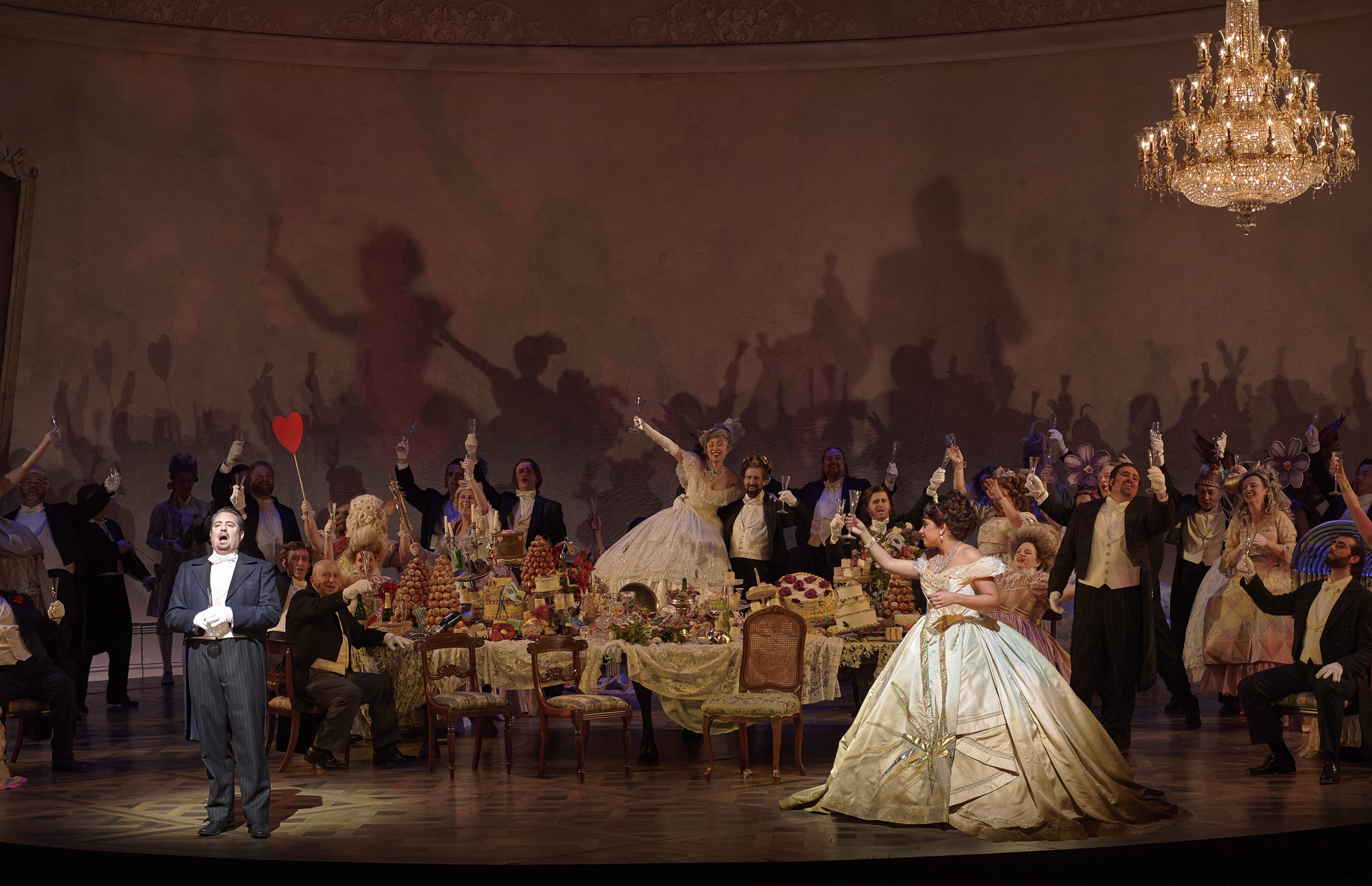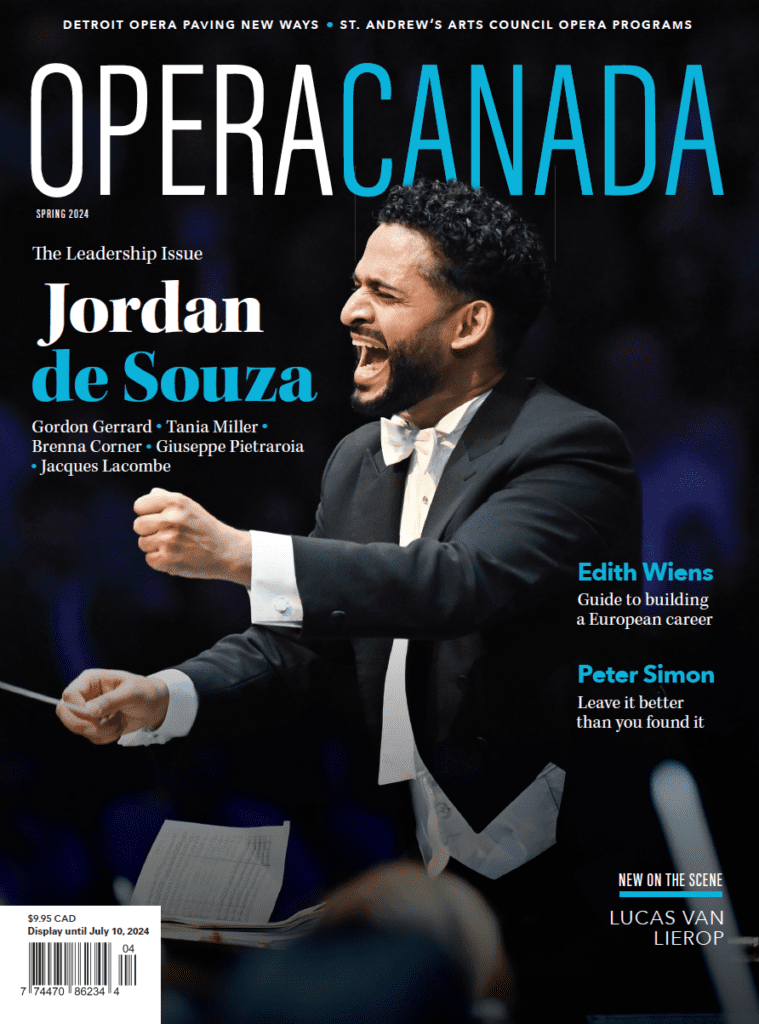This straightforward production is set in the contemporary, mid-century Paris Verdi wanted (censors made him set the action back in the 1700s), though Cait O’Conner’s elaborately wrought costumes for the party scenes, Riccardo Hernandez’s stylized sets and Marcus Doshi’s atmospheric lighting keep the action a good few notches away from faux realism. Arbus handles the crowded parties in Acts 1 and 2 well, neatly creating the space within them for the more intimate encounters between the principals. The only questionably artificial moment comes in the Act II party at Flora’s, where the score calls for entertainers—gypsy girls from afar, matadors from Madrid, and—this production’s innovation—giant puppets of bulls to take part in the dancing merriment. As it did in 2015, the “ballet” strikes me as out of key with the rest of the production and an awkward intrusion before the Act II ensemble finale, one of Verdi’s finest.
I have no reservations, however, about the singing, from principals, secondary characters and chorus. COC Music Director Johannes Debus’s pacing was unhurried but dramatic, with some careful orchestral detailing and colouring, and over all a good balance between the stage and orchestra pit. There are 12 named parts in the opera, most of them short though important for providing foils to the three principals. All were effective here, with baritone Gregory Dahl noteworthy for giving the right vocal weight in the ensemble to Baron Douphol, Violetta’s lover and rival to Alfredo.
The Violetta of Amina Edris, perhaps a bit tentative at the outset, quickly bloomed into a very moving portrayal. The role is notoriously tricky in requiring different singing strengths as the story unfolds—good coloratura skills in Act I, more forcefully dramatic singing in Act II, and more fluently lyrical lines for the dying Violetta of Act III. From the crisp articulation of the runs in Act I’s “Sempre libera” to the heartrending account of “Addio, del passato” in Act III, Edris seemed to have it all in hand technically and artistically—and she’s a good actress, too. She was matched by the eloquent Alfredo of tenor Matthew Polenzani, in Toronto immediately after his acclaimed run at the Metropolitan Opera of Verdi’s French grand opera, Don Carlos. Polenzani has the right Italianate sound and can spin lovely long lines in which his control of dynamics is finely tuned. He’s also a singer-actor, and quickly established the right emotional chemistry with Edris’s Violetta.

Left to right: Matthew Polenzani (Alfredo) and Amina Edris (Violetta) in the Canadian Opera Company’s La traviata, 2022. Photo: Michael Cooper
As Giorgio Germont, baritone Simone Piazzola, like the other two principals making his COC debut, proved a Verdi baritone with an imposing presence vocally and physically, and etched a convincing transformation from dismissive to affectionate in his own relationship to Violetta. Many operas involve a love triangle that pits family loyalties against outside love affairs, though the interplay is more complex and subtle in Traviata than many. This COC staging does a good job of putting an emotional spotlight on all three principals. As it plays out, a dramatic turning point comes not in an encounter between Violetta and either Alfredo or Giorgio Germont; it comes in Act II when the father, outraged by his son’s behaviour, slaps Alfredo’s face with a force that knocks him to the ground, a moment that took the audience aback. The desperate anguish of all three was palpable in the act’s finale.
Opening night of this production had its own unexpected drama when, only minutes before the opera’s end, a medical emergency in the auditorium led to a sudden pause with lights up and curtain down. The emergency, happily, was not serious and the performance resumed to its conclusion. It’s a testament to all the singers and musicians involved that even though the mood had been broken, they were able to immediately reconjure the emotional intensity that had built up through the act and take it to its shattering conclusion.

Left to right: Amina Edris (Violetta) and Simone Piazzola (Germont) in the Canadian Opera Company’s La Traviata, 2022. Photo: Michael Cooper
Performances of the Canadian Opera Company’s La traviata continue to May 20, tickets available here.
Opera Canada depends on the generous contributions of its supporters to bring readers outstanding, in-depth coverage of opera in Canada and beyond. Please consider subscribing or donating today.








